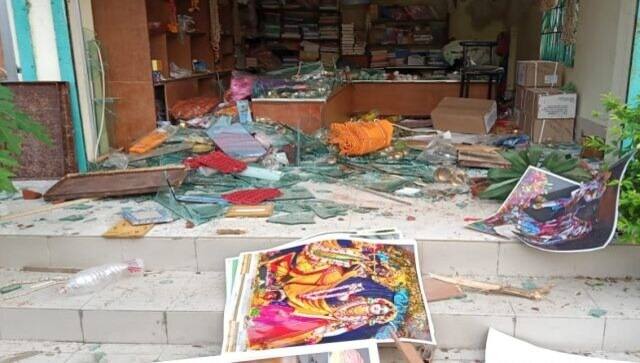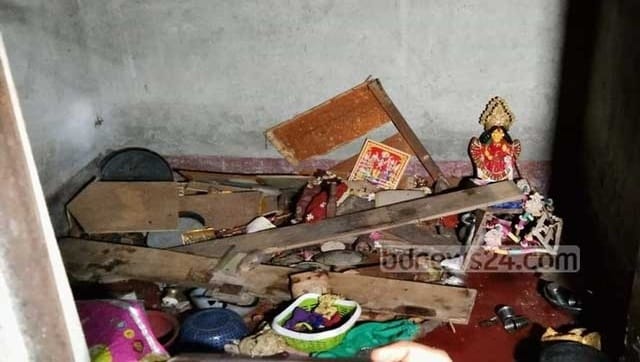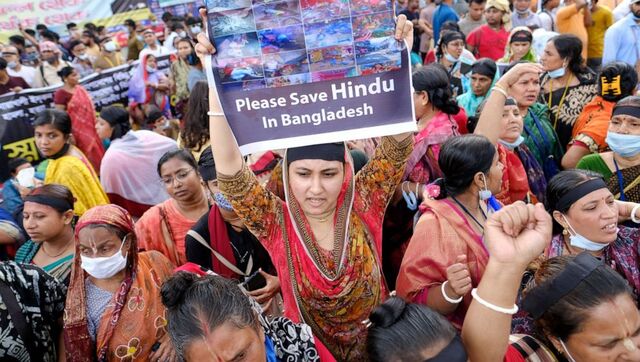In its issue of 6 November 2021, The Economist carried a piece headed, “Bangladesh’s religious minorities are under attack”, commenting on widespread anti-Hindu violence a few weeks earlier during which rioters beat Hindus and attacked their properties. Provocation? A video which showed a police officer carrying a copy of the Quran which he claimed he had found under the feet of a Hindu idol in a temple. The Economist recounted how innocent Hindus were targeted by frenzied mobs shouting “Hang the culprits”. It was Durga Puja day and people were looking forward to celebrating it but were instead caught up in a wave of violent protests. There was Dilip Das, a washerman, who set out for his local temple to take part in the festivities. [caption id=“attachment_10957781” align=“alignnone” width=“640”]  The vandalised ISKCON temple in the Noakhali area of Bangladesh. Image Courtesy: @iskcon/Twitter[/caption] “By the end of the day the 62-year-old Das was dead, bludgeoned by a Muslim mob. ‘What was his sin?’ asks Rupa Das, his wife. ‘He was just a simple man, a washerman,’ who had lived happily alongside his Muslim neighbours,” magazine wrote. Last week, barely eight months later, Bangladesh was again rocked by anti-Hindu protests — this time over an allegedly offensive Facebook post about Islam. It started with a small demonstration but soon descended into a full-blown riot with mob vandalising shops and houses of the Hindu community in an area of Narail district, Southwest of the country. [caption id=“attachment_10921881” align=“alignnone” width=“640”]  Attackers vandalise a temple in Dighalia Bazar area of Lohagara upazila of Narail, Bangladesh. Image courtesy: bdnews24.com[/caption] “After one group looted all our valuables, another group came and found our door open. As there was nothing left to loot, they set our home on fire,” The Daily Star quoted Deepali Rani Saha, a resident, as saying. Her house was among the homes and dozens of shops that were vandalised or burnt down in Sahapara village. Although order was quickly restored the Hindu community remains terrorised. Many fled the village and some are still said to be too scared to return. “Police are on guard in the village, but we cannot trust them,” Shibnath Saha, president of the village’s Radha-Govinda temple was quoted as saying. The truth is that what happened last October and again last week are becoming increasingly frequent. It’s no secret that over the years, radical Muslim groups have been allowed to grow unchecked with the result that a deep-seated anti-Hindu sentiment is always simmering under the surface. And the slightest provocation — real or imagined — is enough to bring it out in the open. Bangladesh’s history of how it treats its Hindu minority is not just embarrassing but shameful for a self-avowed liberal democracy which was born out of a mass struggle for equal rights and social justice and is ruled by the acclaimed revolutionary Sheikh Mujibur Rahman’s Awami League now headed by his daughter Sheikh Hasina Wajed. So, what happened? While we have been focused on calling out Pakistan for its shabby treatment of religious minorities (not just Hindus but various Muslim sects and sub-sects), Bangladesh has been quietly borrowing from Islamabad’s playbook in repressing its Hindu population which at 10 per cent plus is its largest minority group. At least, Pakistan never pretended to be secular. Bangladesh, on the other hand, insists that despite Islam being its official religion it remains secular in practice. As The Economist pointed out while Islam is the state religion “confusingly, the constitution also says the state is secular”. A claim belied by the experience of its Hindu citizens. There has been a steady exodus of its Hindu population over the years leading to a sharp decline — from 30 per cent to nine per cent, according to one estimate. The exact number can be questioned but not the reality of repression. In a civilised liberal and secular democracy, nobody — irrespective of their faith — should feel insecure let alone having to flee their own country. Novelist Taslima Nasreen, who was forced to go into exile in 1994 after receiving death threats over her book Lajja, has alleged systematic persecution of Hindus. “Hindus are tortured, persecuted and threatened. It has been going on for years as Muslims want Hindus to leave the country so that they can grab their land,” she told PTI after last October’s riots. “I actually don’t like to call it Bangladesh anymore. It has become ‘jihadistan’ now. All the subsequent governments including the present one used religion for political motives. They made Islam the state religion so Hindus and Buddhists have become third class citizens and subject to persecution like this,” she added. For Nasreen, of course, it’s all very personal and she has been accused of using the “Hindu card” to smear her critics. But that doesn’t detract from the basic fact that Bangladesh is in the grip of a wave of Islamist intolerance — and while its victims also include progressive Muslims, the worst of it is being borne by religious minorities, particularly Hindus. For all its protestations and Sheikh Hasina’s show of handwringing, the Awami League has made little serious effort to check the rise of militant Islam in the country. All too frequently, those responsible for communal attacks get away with it thanks to lackadaisical prosecution. The party has also flirted with radical tendencies to get votes of conservative Muslims in a replay of the Congress-style secularism in India. But instead of acknowledging her administration’s failure to check majoritarian excesses, Sheikh Hasina has often sought to blame it on India’s treatment of Muslims. Responding to anti-Hindu violence last October, she suggested it was a backlash against the problems Muslims were facing in India. In a statement on 14 October, she said: “They (India) have to be aware that such incidents should not take place there which would have an impact on Bangladesh.” Her statement was plainly absurd: It would be equally absurd if India were to justify the anti-Muslim campaign by radical Hindus as a backlash against the persecution of Hindus in Pakistan and Bangladesh. Seeking refuge in equivalence has always been a favourite political ploy of those in power to cover up their own abdication of responsibility to protect their minorities. The bottom line is that you can’t fight intolerance and majoritarian prejudice in your own ranks by resorting to whataboutery. If Sheikh Hasina is really serious about upholding her government’s moral obligation to safeguard the life and property of its minority groups, it should stop taking refuge in disingenuous explanations and start putting its money where its mouth is. Unfortunately, majoritarian nationalism is spreading across the subcontinent but that’s a debate for another time, and what is happening to Hindus in Bangladesh should not be allowed to be rationalised. Meanwhile, there’s a glaring lack of solidarity among minorities themselves. I’ve rarely seen Indian Muslims stand up for persecuted minorities in Pakistan and Bangladesh; likewise, minorities in those countries have little time for them. Every time we ignore what’s happening to minorities in other countries we diminish a little more of our own moral right to demand support from others. Hasan Suroor is an independent commentator. Views expressed are personal. Read all the Latest News , Trending News , Cricket News , Bollywood News , India News and Entertainment News here. Follow us on Facebook, Twitter and Instagram.
Last week, barely eight months after the 2021 Durga Puja violence, Bangladesh was again rocked by anti-Hindu protests — this time over an allegedly offensive Facebook post about Islam
Advertisement
End of Article


)

)
)
)
)
)
)
)
)



